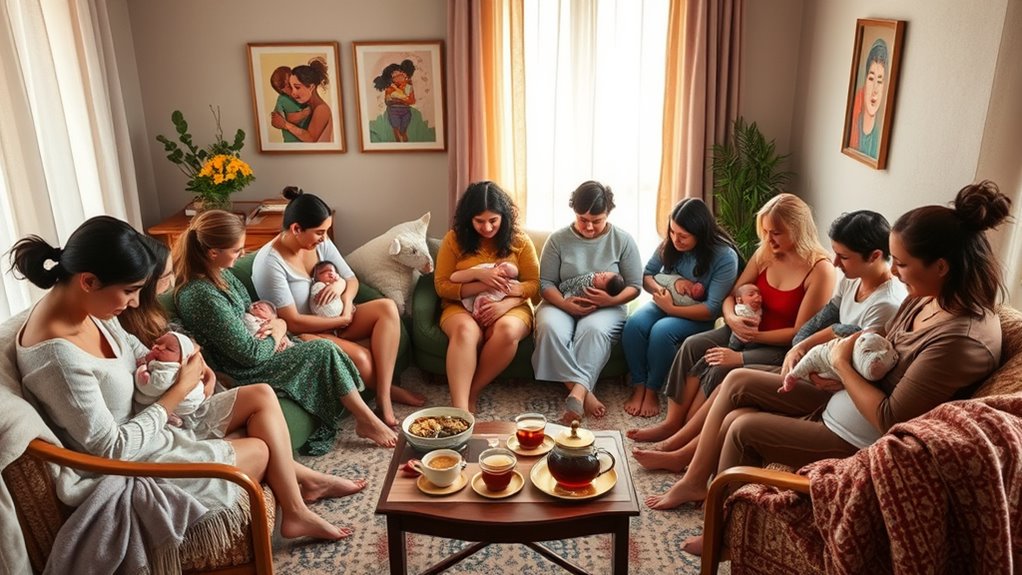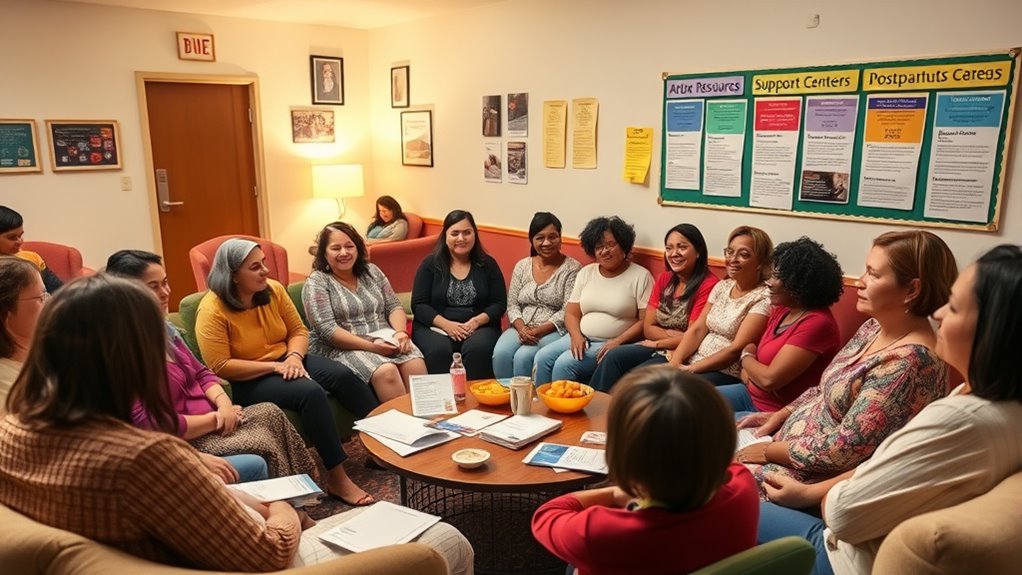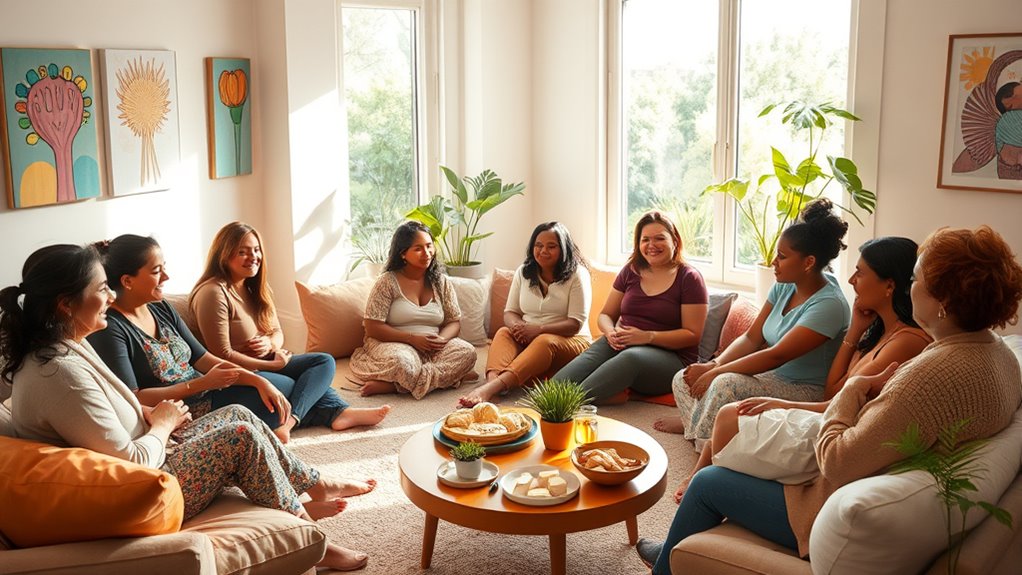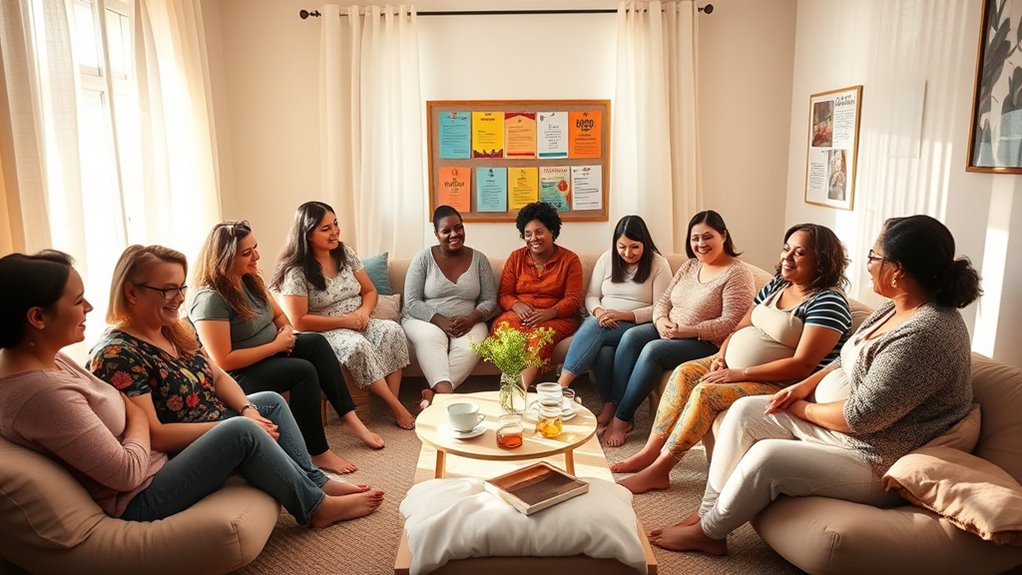Local postpartum support groups can greatly boost your mental health during those early months of parenthood. You’ll find encouragement and a sense of belonging in these safe spaces, where you can share experiences and learn coping strategies. From general groups to those focused on specific issues or demographics, there’s something for everyone. Accessibility is improved with online options, making it easier to connect. Discover how these groups can make a difference in your journey.
Key Takeaways
- Local postpartum support groups provide emotional validation and coping strategies for new parents in a safe environment.
- Online platforms and directories, like Meetup.com, help locate in-person and virtual support groups in your area.
- Community centers and healthcare facilities often host free or affordable postpartum support groups for new mothers.
- Culturally sensitive options cater to diverse backgrounds, enhancing accessibility to support for all families.
- Joining a support group fosters a sense of belonging and reduces feelings of isolation for parents and their families.
Benefits of Joining a Postpartum Support Group

Joining a postpartum support group can greatly boost your mental health and well-being, especially during those challenging early months of parenthood. You’ll find communal encouragement and comfort in a safe setting, where you feel accepted and understood.
Regular meetings provide ongoing support and treatment options, fostering emotional validation that helps combat feelings of shame and guilt. You’ll gain practical tools and healthy coping skills for managing symptoms, alongside educational resources about postpartum depression.
Connecting with others facing similar challenges combats isolation and builds a network of camaraderie, allowing you to share tips and experiences. Ultimately, these groups enhance your overall mental health, creating a sense of belonging that benefits both you and your family.
Types of Postpartum Support Groups Available

When maneuvering through the complexities of postpartum life, you’ll find various types of support groups tailored to meet different needs.
General postpartum support groups allow new mothers to share experiences and emotions, led by trained clinicians focusing on coping skills and social connections.
General postpartum support groups foster connection and healing for new mothers, guided by professionals emphasizing coping strategies and shared experiences.
If you seek cultural understanding, consider cultural and language-specific groups that connect women from diverse backgrounds.
For flexibility, virtual support groups offer access anytime, letting you join anonymously if you wish.
Thematic focus groups tackle specific issues like postpartum depression or parenting challenges.
Finally, targeted groups cater to specific demographics, such as single mothers or NICU parents, providing resources and community tailored to your unique situation.
Accessibility and Availability of Support Groups

While maneuvering postpartum challenges, understanding the accessibility and availability of support groups is essential for new mothers.
Geographic disparities can make it tough for those in rural areas to access these resources, but online platforms offer a convenient alternative. Support groups are often affordable, sometimes even free, helping alleviate financial constraints.
You’ll find culturally sensitive options available, catering to diverse needs and languages, enhancing accessibility for everyone.
Healthcare providers play a vital role, although their availability varies. Community centers and social media can connect you with local support networks.
The Impact of Support Groups on Family Members

Support groups greatly impact family members by providing essential emotional support and coping strategies. You gain a better understanding of the emotional challenges your loved one faces, which helps reduce feelings of isolation.
These groups equip you with stress management techniques, making it easier to handle the pressures of supporting someone with postpartum depression. Improved communication is another benefit, as you learn to express feelings and support each other more effectively.
Connecting with others in similar situations fosters empathy and a sense of community. Additionally, you’ll discover valuable resources and strategies that help navigate the complexities of postpartum challenges, ultimately enhancing your family’s overall well-being and strengthening your relationships.
Resources for Finding Local Support Groups

How can you find local postpartum support groups that meet your needs? Start by checking websites like Meetup.com, which lists various in-person groups across the U.S.
Postpartum Depression Organizations also provide valuable resources for both in-person and virtual support. The Motherhood Center offers inclusive virtual options tailored for pregnant and postpartum individuals.
Don’t overlook your local healthcare facilities; many hospitals host support groups for new parents. Non-profit organizations, like Postpartum Support Virginia, guarantee accessibility by offering both in-person and virtual options.
Finally, consider online directories to find listings and community centers for additional resources. By exploring these avenues, you can easily connect with a supportive community.
Frequently Asked Questions
What Should I Expect During My First Support Group Meeting?
During your first support group meeting, you can expect an open and welcoming environment where everyone shares their experiences.
You’ll connect with others facing similar challenges, which helps reduce feelings of isolation.
The meeting may involve discussions about emotional struggles, parenting tips, and self-care strategies.
You’ll also learn about resources available to you.
Can I Bring My Baby to the Support Group?
Yes, you can usually bring your baby to the support group! Many groups welcome infants, allowing you to participate without worrying about childcare.
Having your baby with you can create a relaxed atmosphere, making it easier to connect with other mothers. Just check the specific group’s policies, as some may have guidelines about babies in attendance.
Are Support Groups Confidential?
Yes, support groups are typically confidential. This means your personal experiences and discussions stay within the group, allowing you to share openly without fear of judgment.
Trust is essential, as it fosters deeper connections among members. While there are legal and ethical guidelines to follow, breaches of confidentiality are rare.
You can feel secure knowing that your privacy is respected, which encourages participation and helps create a safe, supportive environment for everyone involved.
How Long Do Support Groups Typically Last?
Did you know that about 70% of support groups run on a weekly or bi-weekly schedule?
Typically, these groups can last anywhere from a single session to ongoing meetings. Some might be structured for a specific duration, like 12 weeks, while others provide flexibility.
The key is consistency, helping you establish a routine and access support regularly. Each session usually stays within a consistent time frame, ensuring everyone gets the most benefit.
Can I Join a Group if I Am Not Experiencing Postpartum Depression?
Yes, you can definitely join a postpartum support group even if you’re not experiencing postpartum depression.
Many groups focus on broader perinatal mental health issues and early parenthood challenges. They welcome anyone seeking support, including partners and family members.
You’ll find that sharing experiences and learning coping strategies in a judgment-free space can be beneficial, whether you’re dealing with specific issues or just looking for a sense of community.
Conclusion
Joining a postpartum support group can be a game-changer for new parents. Did you know that about 1 in 7 women experience postpartum depression? By connecting with others who understand your journey, you not only find emotional support but also practical advice and friendship. Families often thrive when parents have a solid support network, helping everyone adjust to the new dynamics. So, don’t hesitate—reach out and find a local group to share your experiences and build lasting connections.









